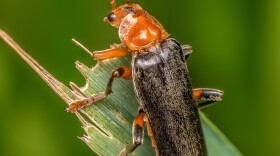After getting a terrible night of sleep you may feel tired, disoriented, and sluggish as you attend to your daily routine.
Surprisingly, humans and honey bees are much the same when it comes to sleep. Whether it’s a bee after a full day busily attending to colonial duties or a human after a long day at the office, we both need sleep to continue to function at our best.
Similar to humans and our circadian rhythm, in 1983 studies revealed that honeybees sleep between five and eight hours a day. This was the first record of sleep discovered in any invertebrate species. In the case of forager bees — the bees heading out to find nectar and pollen — just like us, their activity revolves around day-night cycles, sleeping at night and being active by day.
To determine just what happens to a sleepy bee’s productivity, a number of studies have kept forager bees up at night and looked at how they performed the next day. To sum it up … not so well. The sleep deprived insects struggled in a number of ways.
They became sloppy and inaccurate in their waggle dance — the way honeybees communicate the location of prime flower patches to other bees, their misguided directions impacting the entire hive’s efficiency.
They also found it difficult to find their way back to the hive after visiting flowers, spending more time reorienting themselves. Many bees even became completely lost, never to return to the hive.
Luckily, humans have coffee to help us deal with an occasional bad night’s sleep. As for the bees, take our advice: “Early to bed and early to rise is best for each bee as well as the hive.”





